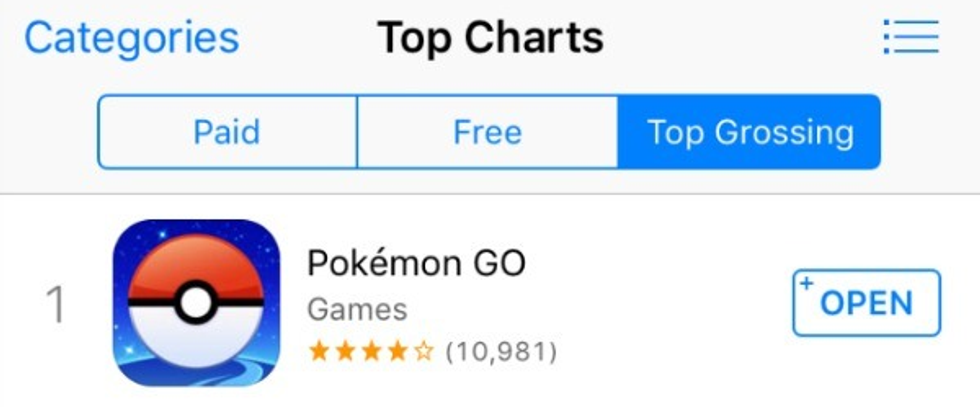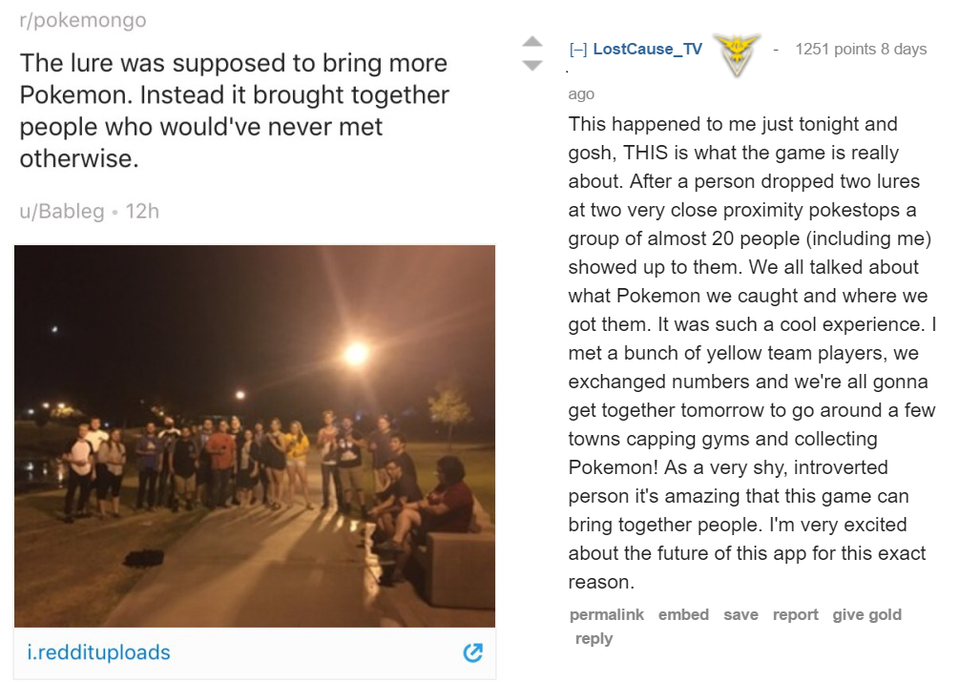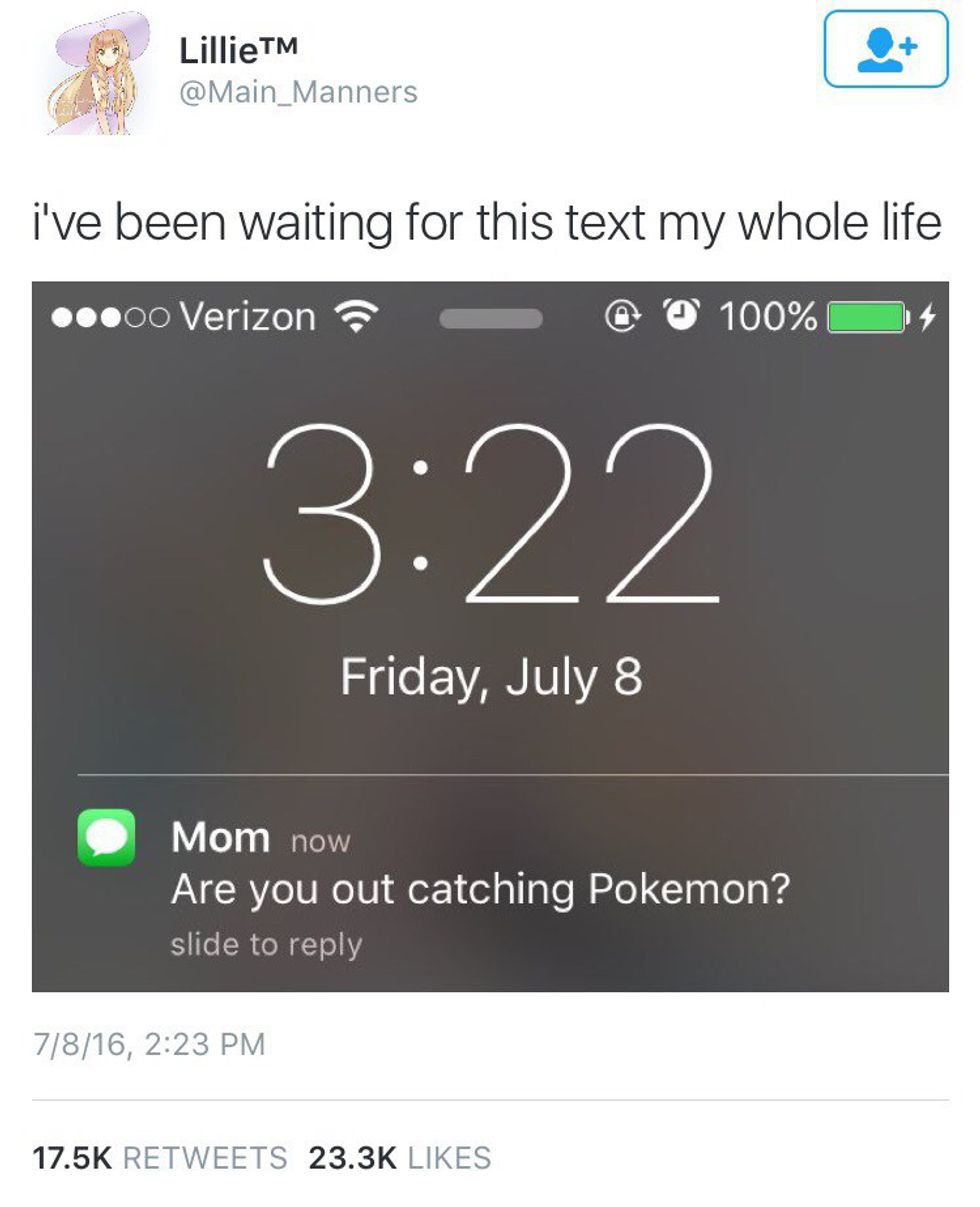Pokemon Go is the biggest mobile game in American history. Less than a week after its release, it was downloaded 15 million times, sending Nintendo's stocks through the roof. It had more active daily users than Tinder and Twitter on Android, and by the time you are reading this, it has probably already passed Snapchat and Google Maps. As you might have guessed, the effect is certainly not limited to Android:
Why is it so insanely popular? The game's design has certainly played a role, as you can see by taking a memetic perspective (looking at how it reproduces as an idea). The founder of the game's production company Niantec, John Hanke, described the phenomenon as a "loop of people discovering it, hearing about it through media or social media, playing the game and then bumping into other people playing the game, and then sharing their experiences around that through social media." The Pokemon Go craze is good at self-replicating because people who have it spread it by showing it off to their friends and the public. It would be like if a contagious disease could make its hosts go out in public and sneeze on people.
Not that I mean to insult the craze by comparing it to a disease, mind you. It has encouraged many gamers to exercise, which is especially beneficial to people who would otherwise struggle to find the motivation. Where most games explicitly aimed at fitness have failed (popularity), it has succeeded. Similarly, the game has encouraged socialization among those who otherwise struggle with it. One mother was brought nearly to tears when she saw her autistic child laughing and excitedly catching Pokemon with other children on the playground when he would barely talk to them before. Reports of people meeting new friends and learning about cool sites in their community due to Pokemon Go are all over the Internet:
There must be more to the game's explosion of popularity than its design. After all, Niantec made a similar game that received far less attention. Why did Pokemon Go succeed where that game failed?
While there has not been enough time to carry out a randomized survey and ask users why they are playing the game, I saw a popular Twitter post the other day with the best explanation I have yet found:
I've been waiting for this my whole life
For those born in the 90s, Pokemon Go is an opportunity to finally live out a childhood dream. Pokemon had a huge influence on many millennials' childhoods, with TIME Magazine describing "Pokemania" as "a multimedia and interactive barrage like no other before it, with children mesmerized into cataloging a menagerie of multiplicative monsters, with trading cards linked to games linked to television shows linked to toys linked to websites linked to candy linked back to where you started." As almost any parent whose kids grew up during the age of Pokemania can tell you, Pokemon was everywhere.
Still, there was more to Pokemania than endless merchandizing. At the heart of Pokemania was a dream that appealed to a child's sense of wonder: you too can capture these awesome gods creatures and travel all across the region, competing with them to become a champion. You and your Pokemon, on top of the world.
Even as the Pokemon games have gone through impressive advancements in graphics, though, there has been the same limiting factor as with all fiction: as much as you try to imagine yourself into this fantastical world, it's not this world, and it'll never be this world. Fiction is fiction, and dreams are dreams, so get over it. You'll never see a Pokemon in real life.
But now you can.
Pokemon Go works by superimposing virtual images onto the real world. This concept, called "augmented reality," is similar in a sense to virtual reality. But instead of bringing you to a fantastical dream world, it brings a fantastical dream world to you. It brings imagination to life.
The huge success of Pokemon Go could usher in the rise of augmented reality in games. If so, it could be the opportunity of a lifetime not only for children to experience creativity and imagination like never before but for adults to regain one of the most precious aspects of childhood: seeing fantastical stories in the mundane reality of everyday life.
For more information on this subject, check out some of the following resources:
Singularity Hub: "Pokemon Go Is a Glimpse of Our Augmented Reality Future"
Gameranx: "Pokemon GO Is Proof Video Games Are The Best Way To Fight This Generation’s Health Problems And More"
CNN: "How Pokemon GO is Changing The World"
Forbes: "Why Pokemon GO Is Good For Data and Great For Business"
























